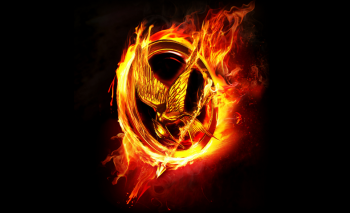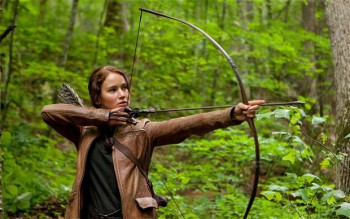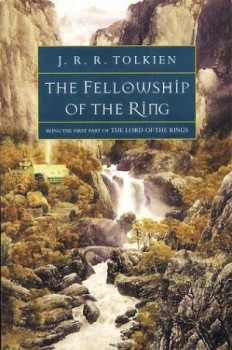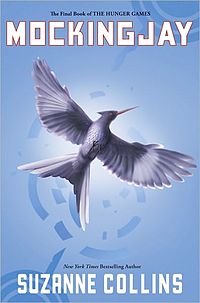The Hunger Games and Kids: When to Say When?
 On a recent visit, my sister was shocked to discover that my boys had with them a copy of Mockingjay. At first, she assumed it was Corey’s (Corey is nearly thirteen), and was therefore even more horrified to learn that it was Evan’s book. Evan is eight.
On a recent visit, my sister was shocked to discover that my boys had with them a copy of Mockingjay. At first, she assumed it was Corey’s (Corey is nearly thirteen), and was therefore even more horrified to learn that it was Evan’s book. Evan is eight.
My sister accosted me later that night (with my boys and hers all tucked up in various beds, visions of Minecraft dancing in their heads) and asked how I had come to the decision to let Evan tackle The Hunger Games books. She did not approach on an attack vector ––“How dare you let him read this trash!” No, no. Opinionated my sister certainly is, but she’s a smart (and tolerant) cookie.
Even so, my answer took the better part of twenty minutes to deliver, because I myself am puzzled by why Evan is reading The Hunger Games and why I (having viewed The Hunger Games and read Catching Fire) am at least tacitly condoning his choice.
In retrospect, I suppose my response boils down to two points. First, nearly all of Evan’s third-grade  classmates have already devoured The Hunger Games series, and second, my experience with other forms of screen and print violence tell me that Evan does not process or receive said violence in the same way that I did at his age. Also, his age-appropriate built-in shock-resistant sensors instantly gloss over pretty much anything sexual.
classmates have already devoured The Hunger Games series, and second, my experience with other forms of screen and print violence tell me that Evan does not process or receive said violence in the same way that I did at his age. Also, his age-appropriate built-in shock-resistant sensors instantly gloss over pretty much anything sexual.
For those who saw my last post (“The Scariest Hour in TV History”), you will already know that I have ‘fessed up to being a scaredy-cat kid. Had The Hunger Games existed when I was Evan’s age, I would have made it no farther than the start of the actual games before slamming the covers shut. The action described would have been too adrenalized, too fearsome, and certainly too nightmare-inducing for my fragile eight-year-old psyche.
My sister, at forty-something, had much the same response; she described her Hunger Games reading experience as sufficiently pulse-pounding and tense that it gave her a headache.
 Evan, however, is in the superhero phase of his young life. The good guys fell their opponents with clear, bold strokes, and evil always loses. When his school went through an all-too-real lockdown recently, the upper grades feared for their lives; there was genuine trauma, and many tears shed. Meanwhile, Evan and his fellow third graders plotted how they would bust out their “ninja moves” on “the robber” when he came through the door. He still seems wistfully disappointed that “the robber” never arrived.
Evan, however, is in the superhero phase of his young life. The good guys fell their opponents with clear, bold strokes, and evil always loses. When his school went through an all-too-real lockdown recently, the upper grades feared for their lives; there was genuine trauma, and many tears shed. Meanwhile, Evan and his fellow third graders plotted how they would bust out their “ninja moves” on “the robber” when he came through the door. He still seems wistfully disappointed that “the robber” never arrived.
The violence of The Hunger Games comes to Evan via this hyper moral and highly distanced lens. The book’s fictive reality –– the part that bothers many adults, my sister included –– simply doesn’t compute. Instead, the conflict gets translated and even transformed. Yesterday, Evan invented a new form of dodge-ball in which eight or more balls (all shapes and sizes) are gathered in the middle of a playing space. All participants retreat to various corners (“spawn points”) and at the word “Go!” we rush all at once, all together, to claim what balls we can and tag the others out. It’s the cornucopia brought to playground life. (Try it for yourself; it’s a great diversion.)
Nevertheless, Evan’s indoctrination into all things Hunger Gamey comes with a double standard: mine. I am not willing to let him watch the film. At least not yet. Is this fair? I’m honestly not sure. There’s a level of photo-realism to the film The Hunger Games that seems to me to be inescapable, untranslatable. The attack by the girl with the knives is scary, taut stuff, as is the mauling by those genetically modified pit bulls. In the very first (awful, gruesome) moments of the game proper, the youngest of the sacrificial lambs is done in with a ferocious splatter of blood. (My artistic differences with the film are assayed at length on my very own Anti-Blog, from April 5th, 2012.)
But is my “book yes, movie no” stance an untenable double standard?
Neil Gaiman would likely say so. In a recent essay (and I cannot for the life of me remember where I  read this), he states that it’s “condescending” for any adult to forbid access to a book based on nothing but a child’s age. Perhaps he would say the same about films?
read this), he states that it’s “condescending” for any adult to forbid access to a book based on nothing but a child’s age. Perhaps he would say the same about films?
And yet, the “best of intentions” clause, included in all parenting manuals, insists that there is an optimal window for people to encounter (or first encounter) any given book. My older boy, Corey, tackled The Fellowship of the Ring too early, and only now, two years later, is he curious about The Two Towers. I tried to steer him away from Fellowship at the time (he had just turned eleven), and looking back, I stand by both my advice and my decision to let him shoulder past said advice.
Should one read A Catcher in the Rye at age eleven? Or Bury My Heart at Wounded Knee? What about Little, Big? Mr. Gaiman may have a point that to refuse a child their shot at reading above their station is condescending, but not all books are pitched at children, just as Spot Visits the Farm is not pitched at adults. It can indeed be better to wait.
Are movies really so different? Here’s the previous paragraph, re-written to include (deliberately incendiary) films:
 Should one watch Thelma and Louise at age eleven? Or Leaving Las Vegas? What about Pan’s Labyrinth? Mr. Gaiman may have a point that to refuse a child their shot at “reading” above their station is condescending, but not all movies are pitched at children, just as The Teletubbies is not pitched at adults. It can indeed be better to wait.
Should one watch Thelma and Louise at age eleven? Or Leaving Las Vegas? What about Pan’s Labyrinth? Mr. Gaiman may have a point that to refuse a child their shot at “reading” above their station is condescending, but not all movies are pitched at children, just as The Teletubbies is not pitched at adults. It can indeed be better to wait.
My inconsistency rears its head on other fronts, too. My wife and I keep National Public Radio on for hours every day, and we don’t turn it off when the subject turns to –– well, you name it. War. Famine. Bombings in Boston, where much of my extended family still lives. The world is violent, and children must discover, via any number of methods, how to cope with that violence.
Yesterday, Evan’s best buddy “Andy” came over to play. I asked Andy if he had read The Hunger Games. “No,” he said, because his parents wouldn’t let him. I asked if he wanted to read it. “No,” he said, “not really.” I asked if his classmates were reading it. Again, “No.”
Andy, then, is living a lucky life, at least in this regard. His class has not pushed forward quite as quickly, so the peer pressure to absorb “older” books is absent. Not that Andy is free of aggressive impulses. He and Evan spent most of their day as Jedi, beating the crap out of imaginary droids, Sith, and clones. Heroes of their tale and masters of their universe, Evan and Andy busted out all sorts of crazy ninja moves; by the time the sun had set, not a robber was left standing.
But I worry, still, that somewhere out in the tangle of trees behind my house, Katniss Everdeen is lurking, bow drawn, and she’s aiming for my child.
Mark Rigney’s latest story for Black Gate was “The Find,” which Tangent Online called “reminiscent of the old sword & sorcery classics… A must read.” You can see what all the fuss is about here.
I don’t see your stance as an inconsistent at all. Different mediums come with different dynamics that can affect our psyches in different ways–some of them not always the most constructive. Thus, I think it’s wise of parents to screen certain books, movies, and television shows on a case by case basis.
Though I see your stance as reasonable I think your first stated reason–nearly all of your son’s classmates have “devoured” the same book or series–is a poor one for letting your child experience it. As far as I can see, the popularity (or unpopularity) of some book or movie has nothing to do with whether it is something that should be experienced. Didn’t you mom ever say to you: “If all your friends were walking off a bridge, would you want to do that too?” (!)
Poignant post Mark, I appreciate your examination. I also agree with mcglothlin.13 above – nothing inconsistent at all. (On a side note, I find myself at odds with Mr. Gaiman yet again.)
What type of reading does your sister typically enjoy? I find it interesting that she gained a headache whilst reading this.
Mcglothlin: My mother never said that. Clearly an oversight on her part! : )
Jason: I don’t want to speak FOR my sister, but I would say that in general, she’d be more comfortable with PRIDE & PREJUDICE (which I finally read this winter) than with anything involving children killing children during arena-style warfare.
Also, I’m now about a third of the way through MOCKINGJAY. I miss the narrow scope of the first book: Katniss against the world. Now it’s Katniss co-opted BY the world. What was it Justin Hayward and John Lodge said? “Revolution’s never won, it’s just another form of gun…”
I do think there’s a difference between letting him read the book and letting him watch the movie (and I suspect Gaiman was, in fact, talking specifically about books) — reading requires much more effort & engagement than simply sitting and watching something on a screen, and is also going to be filtered through the reader’s experience (or lack thereof) in a way that a movie will not be.
I have a similar problem; books are up against TV. We’re a million miles from EE Nesbet.
To an extent you just have to trust your kids. I have a rule no atrocities, no explicit torture or on screen sex.
To really freak out your sister, try Andy McNab’s Boy Soldier.
I never really got people forbiding their children to read something or watch a movie (but then i was a spoiled child in that regard, my parents had no problems with me reading “The guns of Navarone” at age 9. Comics, on the other hand were clearly made to lead the nation’s youth into sin…). Anyway, your children are gonna read it/watch it/play it anyway and you can’t do anything about that. And they will cope, even if you won’t. The only think you could do is try to steer them into a creative direction, as in “You like that story? Write your own”.
As for zornhau’s “You need to trust your kids”: if that should be read as “trust your kids, they’ll be alright”, i whole heartily agree.
If that was meant as “Trust your kids to stay away from …”, forget it. Try to see it from their point of view:
Why should they? If its forbidden it is interesting.
Why should they trust *your* judgement? Your youth was a long time ago.
The short version: book yes, movie no.
There’s a big difference between the way our brains process images we generate from our imagination (including reading) and the way our brains process images we take in through our eyes.
Weirdly, there’s a lot less difference between the processing of stress-inducing images we see that really happen and stress-inducing ones we see on screens. Even for adults, even when we know the images are fiction, if it’s the kind of image that the amygdala evolved to process, the amygdala will treat it just as if it were real. That our prefrontal cortices are doing all kinds of higher-function pyrotechnics at the same time has no bearing on what the more primitive parts of the brain are up to. The amygdala is yellling Trauma! Trauma! and the viewer who is predisposed, hereditarily or however, to PTSD, is filing the images where permanent nightmares go.
Purely on a gut level, I imagine I’d want my own boys to wait until age 14 to read The Hunger Games, and I’d insist they wait that long to see the film. They’re a lot younger than that at the moment, so of course I could surprise myself when the subject eventually comes up.
(I’m 43, and I’m too young for the Cornucopia scene.)
As Sarah points out, youth is numerical AND a state of mind. I’d opine that it is also entirely chimerical. Luckily, by two of those standards, I remain “Forever Young.”
This morning, over a bowl of very banal but aptly named Life Cereal, I finished up MOCKINGJAY.
SPOILER SPOILER SPOILER SPOILER
Katniss survives, and even has children of her own. At which point, author Suzanne Collins anticipates (perhaps a little too knowingly) my entire essay, above. Let’s invoke the laws of Fair Use as I retype one of her final passages:
“The arenas have been completely destroyed, the memorials built, there are no more Hunger Games. But they teach about them at school, and the girl knows we played a role in them. The boy will know in a few years. How can I tell them about that world without frightening them to death? My children…”
A personal experience with how children filter what they read (and I agree that movies are harder to filter, so I understand why you might allow reading the book before allowing the movie to be seen): My parents didn’t have a problem with me reading ‘above’ my level; interestingly at our public library the children’s/teen books were on ground level while the regular/adult reading level books were on the second floor. I always felt proudly mature going up those steps, though of course in hindsight I recognize that I was much less mature than I felt. I was in fourth or fifth grade, reading a Tom Clancy novel (I don’t recall which one, and was doing so because my father read them), and had brought it to school with me. I got in trouble with the school and my parents called in because I had showed other students a passage that referred to rape. Not of individuals, rather it described what was being done to a country, which really doesn’t diminish the vileness of the act. I was ignorant of what this word truly describes; I binned it with all the other “adult” ideas I didn’t fully understand: bottles high in the cupboards I wasn’t allowed to drink, R-rated movies I wasn’t allowed to watch. I didn’t show that passage to other students because what I was reading was damaging me, I showed them because it made me feel and seem more mature than I was, especially in relation to my peers. That in itself was an indicator I wasn’t mature enough yet to read about that topic. Figuring out when a child is mature enough to handle adult topics will, I think inevitably, involve some uncomfortable crossing-the-line experience. Those either turn into teaching moments if they are mature enough to handle the topic, or let’s-wait-till-you’re-more-mature moments. The tricky bit is that if a child isn’t allowed to push their reading level, those boundaries won’t be found and opportunities to teach important lessons lost.
It’s interesting how literature affects people at different ages. Sadly, these always turn into arguments over ‘censorship’. I remember reading about the classics of Chinese literature and how they were stereotyped as good/bad based on age. My own experience I remember reading Burroughs (the Naked Lunch one) in my early 20s. wasn’t disturbed, but not impressed. Years later, re-reading I am amazed at his works. Likewise, very VERY early I read Any Rand’s “Anthem” and loved it, but then I moved to fifth grade and discovered Robert E Howard, Conan, the last gasps of Creepy magazine and a bucketful of GOR. Much more intelligent, entertaining, classic literature. I actually thought Any Rand was a “JR Fiction writer” since a teacher was wild about her… And those that worship her tended to be introduced to her in college.
I think the biggest age issue is that those too young simply don’t appreciate or understand it. Quoting an Electric Sheep – “Terrors of the Night” – “Richard Mattheson’s story was on par with Kafka’s Metamorphosis, but to a twelve year old boy, it is one thing, a woman being chased around the house by a Zuni fetish doll with a steak knife!”. Myself, I often go into rabid Conspiracy Theory that the Reptile controllers want to destroy man’s civilization by forcing the “Classics” years too early. Imagine, by contrast, reading Rand in grade school, “The time Machine” in College and Burroughs after.. (the Tarzan/Mars one young, of course!). But it’s just likely well-meaning teachers who also fear getting fired, such as over Harlan Ellison stories, as has happened.
[…] Mark Rigney’s post on how old a kid should be before reading or watching The Hunger Games touched on a problem I face often as a teacher of teenagers, some as young as 13. Since I’m a freelance teacher, making house calls, my students’ parents are sometimes directly involved in the question of how old is old enough for which book. Other times, especially when the parents don’t speak much English, I actually wish I could involve them more directly than the language barrier allows. I’ll face the age question all over again, differently, when my own kids can read on their own. Inevitably, I come at the predicament through my own history as a reader–which stories I was denied too long or permitted too early. As a maker of stories, I’m fascinated also with seeing what of a story can survive the translation into the consciousness of the young, either through the efforts of adult writers who reinterpret the stories, or through the efforts of kids themselves when they try to make sense of them. […]
Got a cousin who resents, decades later, the librarian who thought Watership Down must be a kid’s book because it has bunnies. And he was a very precious reader.
[…] The Hunger Games and Kids: When to Say When […]